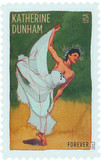
U.S. #4700
2012 45¢ Katherine Dunham
Innovative Choreographers
Issue Date: July 28, 2012
City: Los Angeles, CA
Quantity: 6,250,000
Printed By: Banknote Corporation of America for Sennett Security Products
Printing Method: Offset
Perforations: Die Cut 11
Color: multicolored
Katherine Dunham (1909-2006) has been called the “matriarch and queen mother of black dance.” Her research into Caribbean dances led to a new style of dance that celebrated the African ancestry of Black people in America.
While attending the University of Chicago, Dunham heard a lecture that traced Black American culture to its roots in Africa. In 1936, she traveled to the Caribbean to study dances adapted from African rituals. Dunham returned with research for her master’s degree thesis and ideas for a new American dance form.
Dunham was able to showcase her new style as director of the Negro Unit of the Federal Theatre Project in Chicago. Her group toured throughout the U.S. and the world. Though well-received on stage, they encountered racial prejudice in many U.S. cities and foreign countries.
Dunham created two schools to teach African-American children dances that reflect their roots, as well as drama and humanities. She also felt gang members could redirect their energy and frustration away from violence and toward the performing arts.
Katherine Dunham was more than a dancer and choreographer. She was a scholar and educator who advanced African culture through her life’s work.
Less
U.S. #4700
2012 45¢ Katherine Dunham
Innovative Choreographers
Issue Date: July 28, 2012
City: Los Angeles, CA
Quantity: 6,250,000
Printed By: Banknote Corporation of America for Sennett Security Products
Printing Method: Offset
Perforations: Die Cut 11
Color: multicolored
Katherine Dunham (1909-2006) has been called the “matriarch and queen mother of black dance.” Her research into Caribbean dances led to a new style of dance that celebrated the African ancestry of Black people in America.
While attending the University of Chicago, Dunham heard a lecture that traced Black American culture to its roots in Africa. In 1936, she traveled to the Caribbean to study dances adapted from African rituals. Dunham returned with research for her master’s degree thesis and ideas for a new American dance form.
Dunham was able to showcase her new style as director of the Negro Unit of the Federal Theatre Project in Chicago. Her group toured throughout the U.S. and the world. Though well-received on stage, they encountered racial prejudice in many U.S. cities and foreign countries.
Dunham created two schools to teach African-American children dances that reflect their roots, as well as drama and humanities. She also felt gang members could redirect their energy and frustration away from violence and toward the performing arts.
Katherine Dunham was more than a dancer and choreographer. She was a scholar and educator who advanced African culture through her life’s work.














